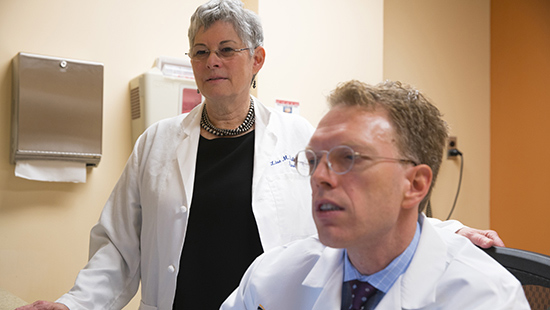Parkinson's Disease Research and Clinical Trials

The physicians at our center are all actively involved in research covering a large range of topics.
Their research interests include:
- Parkinson’s disease
- Parkinson’s disease Dementia
- Parkinsonian syndromes
- Huntington’s disease
- Dystonia
- Essential Tremor
Further research into these topics includes investigations of new medications, new surgical options, and non-pharmacologic therapies like exercise.
Current projects include:
- Investigating a better understanding of the mechanisms of movement disorders including federally funded trials through the NIH and VA
- Investigating the use of ultrasound instead of Deep Brain Stimulation Surgery
- Looking into potential genetic links with Parkinson’s disease
- Various clinical trials for new medications and devices
Read about BIO-VIS, our research project focusing on data collected over 15 years and from 2,500 patients.
Clinical Trials
Clinical research trials are special programs in which new medications or devices are tested and investigated to determine if they are safe and effective. These trials are open to patients with mild, moderate and severe Parkinson's disease.
The Maryland Parkinson's Disease and Movement Disorders Center offers a wide range of programs which are exploring new research treatments in Parkinson's disease. The Center is a division of the Department of Neurology and is a full service diagnostic center for Parkinson's disease and other movement disorders.
View UMMC's clinical trials for Parkinson's disease.
We are also members of the Parkinson Study Group, a North American Consortium of Research Neurologists who conduct clinical research studies in Parkinson's disease.
At the Maryland Parkinson's Disease and Movement Disorders Center we believe patients' involvement in research studies is a good idea, for the following reasons:
- Treatment of Parkinson's disease can be improved when people with Parkinson's consent to participate in programs that test drugs.
- In clinical research trials, new treatments are tested on patients in carefully planned studies designed or monitored by physicians and statisticians, and people in these trials might have access to helpful drugs years before the drugs are available to others.
- People who participate in clinical trials tend to do better than people who do not, even when the people in trials are receiving a placebo rather than a drug. This is because participants in clinical trials receive intense medical attention and monitoring; they are working with people who are especially interested in their disease; they are actively participating in controlling their disease; and they feel better.
